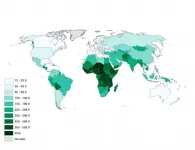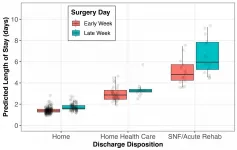(Press-News.org) April 06, 2020-- A new commentary published online in the Annals of the American Thoracic Society provides an exhaustive examination of published research that discusses whether air pollution may be linked to worse COVID-19 outcomes. The studies that the authors examined look at several potential disease mechanisms, and also at the relationship between pollution, respiratory viruses and health disparities.
In "COVID-19 Pandemic: A Wake-Up Call for Clean Air," Stephen Andrew Mein, MD, Department of Medicine, Beth Israel Deaconess Medical Center, Boston, and colleagues discuss several ways that the COVID-19 pandemic highlights the urgent need to address the global problem of air pollution through sustainable local and national policies to improve respiratory health and equity worldwide. More than 91 percent of the world's population lives in areas that exceed the World Health Organization's air quality guidelines and more people are impacted by worsening air quality each year.
The commentary focuses on the health effects of ambient air pollution. Ambient air pollution consists of potentially harmful pollutants, such as small particles and toxic gases, emitted by industries, households, cars and trucks. International studies have shown that exposure to these pollutants worsens viral respiratory infections and new studies are showing a similar association with ambient pollution and COVID-19 outcomes.
"There are a multitude of studies showing that exposure to higher long-term ambient air pollution is associated with both increased risk of infection and death from COVID-19," Dr. Mein said. "Historically, air pollution has been linked with worse outcomes, including higher mortality, due to other respiratory viruses like influenza."
He added, "Research that we examined on pollution during the COVID-19 pandemic has found similar detrimental effects. New research on COVID-19 adds further evidence of the adverse effects of ambient air pollution and the urgent need to address the public health crisis of pollution."
One of the most prominent studies that the authors examined, in which COVID-19 mortality was modeled, found that each small (1 ?g/m3) increase in long-term fine inhalable particle (PM2.5) exposure was associated with an 8 percent increase in mortality during the pandemic.
Another study concluded that air pollution has contributed 15 percent to COVID-19 mortality worldwide.
"The studies we reviewed evaluated whether long-term, ambient air pollution exposure that occurred years prior to the pandemic was associated with worse COVID-19 outcomes," Dr. Mein stated.
The exact mechanisms for the association between long-term pollution and poor COVID-19 outcomes are not fully known. However, scientists have suggested several theories. Long-term exposure to air pollution may impair the immune system, leading to both increased susceptibility to viruses and more severe viral infections.
Higher air pollution exposure is associated with higher rates of heart disease and metabolic disorders such as diabetes, which are known to be risk factors for severe disease and death from COVID-19. These chronic effects would have occurred prior to the reported reductions in air pollution since the start of the COVID-19 pandemic.
A major point of the authors' commentary is that improved air quality (due to less travel and industrial activity) during the pandemic may have reduced morbidity and mortality from non-communicable diseases. "Research evaluating associations between the dramatic reduction in ambient air pollution during the global lockdowns and health care utilization for respiratory conditions would further confirm the impact of ambient air pollution on non-communicable diseases and the need to reduce air pollution to improve overall health."
The authors also noted that much of the research about ambient air pollution and the COVID-19 pandemic is just emerging. "While the primary association between air pollution and COVID-19 outcomes has been generally consistent, there is still much research to be done. In particular, there is a need for studies that adjust for individual-level risk factors, since current studies have been restricted to county or municipal-level exposure and outcome data. Research also needs to be conducted to evaluate whether air pollution is contributing to the stark differences in COVID-19 outcomes among minority groups."
Racially and ethnically diverse communities are more likely to be located in areas closer to industrial pollution such as PM2.5 and nitrogen dioxide, and to work in types of businesses that expose them to more air pollution. These inequalities in residential and occupational air pollution exposure may be one of the causes of the stark disparities of the COVID-19 pandemic along racial and ethnic lines.
In conclusion, the authors state, "The COVID-19 pandemic has highlighted the widespread health consequences of ambient air pollution, including acute effects on respiratory immune defenses and chronic effects that lead to higher risk of chronic cardiopulmonary disease and acute respiratory distress syndrome (ARDS). These chronic health effects likely explain the higher COVID-19 mortality among those exposed to more air pollution. The pandemic has also provided a glimpse into the health benefits of cleaner air. As we emerge from this devastating public health crisis, COVID-19 is a wakeup call for the need to adopt stricter air quality standards and end our tolerance for pollution in disadvantaged neighborhoods. As part of our post-COVID-19 recovery, we must clean up the air to improve respiratory health and equality worldwide."
INFORMATION:
A University of Guam review of published research on the critically endangered Serianthes nelsonii tree has revealed a reason why the population of the trees continues to be endangered despite a long history of funded conservation projects and a national recovery plan implemented 26 years ago. The review article, co-authored by biologists of the Plant Physiology Laboratory of UOG's Western Pacific Tropical Research Center, was published on March 2 in Horticulturae journal (doi:10.3390/horticulturae7030043).
"A main message of our paper is that decision-makers from funding agencies limit conservation success when practitioners ...
A revolutionary technology developed within the END ...
WASHINGTON, April 6, 2021 -- Home brewing enthusiasts and major manufacturers alike experience the same result of the beer-making process: mounds of leftover grain. Once all the flavor has been extracted from barley and other grains, what's left is a protein- and fiber-rich powder that is typically used in cattle feed or put in landfills. Today, scientists report a new way to extract the protein and fiber from brewer's spent grain and use it to create new types of protein sources, biofuels and more.
The researchers will present their results today at the spring meeting of the American Chemical Society (ACS). ACS Spring 2021 is being held online April 5-30. Live sessions will be hosted April 5-16, ...
By 2050 global warming could reduce crop yields by one-third. UC Riverside researchers have identified a gene that could put the genie back in the bottle.
Warmer temperatures signal to plants that summer is coming. Anticipating less water, they flower early then lack the energy to produce more seeds, so crop yields are lower. This is problematic as the world's population is expected to balloon to 10 billion, with much less food to eat.
"We need plants that can endure warmer temperatures, have a longer time to flower and a longer growth period," said UCR botany and plant sciences professor ...
DALLAS, April 6, 2021 -- A tsunami of chronic health conditions as a result of the SARS-CoV-2 pandemic, especially cardiometabolic disease, may produce an enormous wave of death and disability that demands immediate, comprehensive strategies. In addition, COVID-19 has disrupted cardiovascular science and medicine, yet it presents opportunities to transform and create novel approaches that can yield new successes. These are the opinions of two esteemed leaders in cardiovascular disease care, research and strategy, detailed in two new Frame of Reference articles published today in the American Heart Association's flagship journal Circulation.
While COVID-19 has severely impacted everyone's daily lives, its societal ...
The inequality is enormous: Mothers in select African countries are more than 100 times more likely to have had a child die than mothers in high-income countries.
This is what Diego Alburez-Gutierrez (Researcher at the Max Planck Institute for Demographic Research (MPIDR) in Rostock, Germany), Emily Smith-Greenaway (Researcher at the USC Dornsife College of Letters, Arts and Sciences in Los Angeles and Guest Researcher at MPIDR), and co-authors found in their recent paper published in BMJ Global Health.
"We offer the first global estimates of the cumulative number of child deaths experienced by mothers ...
CHARLOTTESVILLE, VA (APRIL 6, 2021). New research by a team from the Cleveland Clinic and the London School of Economics and Political Science (LSE) has determined that surgeries performed late in the workweek, and those culminating in discharge to a specialty care facility, are associated with higher costs and unnecessarily longer stays in the hospital following a common elective spine surgery.
Sebastian Salas-Vega, PhD, and colleagues retrospectively reviewed the data for all adult patients who underwent elective lumbar laminectomy over a nearly three-year period at any Ohio hospital included within ...
Newer is not always better; a study in CMAJ (Canadian Medical Association Journal) led by researchers at the University of Warwick shows that simple fetal heartbeat monitoring is still the best method for determining whether a baby is in distress during delivery and whether cesarean delivery is needed http://www.cmaj.ca/lookup/doi/10.1503/cmaj.202538.
Cesarean delivery is the most common surgical procedure worldwide, performed to expedite birth and avoid neonatal complications.
Listening to the fetal heart rate using a stethoscope -- intermittent auscultation -- has been used for years to assess the fetal state and whether the baby is experiencing distress that might require a cesarean delivery. Other monitoring techniques have become ...
Legalization of recreational cannabis may be associated with an increase in fatal motor vehicle collisions based on data from the United States, and authors discuss the implications for Canada in an analysis in CMAJ (Canadian Medical Association Journal).
"Analyses of data suggest that legalization of recreational cannabis in United States jurisdictions may be associated with a small but significant increase in fatal motor vehicle collisions and fatalities, which, if extrapolated to the Canadian context, could result in as many as 308 additional driving fatalities annually," says Ms. Sarah Windle, Lady Davis Institute/McGill ...
Hamilton, ON (April 6, 2021) - If you are one of the millions of people worldwide suffering from allergies, you may take an antihistamine pill to ward off hives, sneezing and watery eyes.
But you may be taking your medications incorrectly, says Derek Chu, a McMaster University allergy expert and clinical scholar.
"People need to rethink what they stock in their home cabinets as allergy medicines, what hospitals keep on formulary, and what policymakers recommend. The message needs to get out. This publication is on time for the spring allergy season and as COVID vaccines roll out, for which rashes are common and antihistamines can be helpful," said Chu.
Co-author Gordon ...






